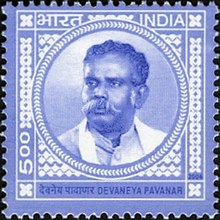Devaneya Pavanar | |
|---|---|
 Pavanar on a 2006 stamp of India | |
| Born | 7 February 1902 Gomathimuthupuram, Madras Presidency, British India (now in Tamil Nadu, India) |
| Died | 15 January 1981 (aged 78) Madurai, Tamil Nadu, India |
| Occupation | Author, Tamil Activist, Etymologist |
Devaneya Pavanar (also known as G. Devaneyan, Ñanamuttan Tevaneyan; 7 February 1902 – 15 January 1981) was an Indian scholar who wrote over 35 research volumes on Tamil language and literature. Additionally, he was a staunch proponent of the "Pure Tamil movement" and initiated the Etymological Dictionary Project primarily to bring out the roots of Tamil words and their connections and ramifications with Nostratic studies.
In his 1966 Primary Classical language of the World, he argues that the Tamil language is the "most natural" (iyal-moḻi) and also a proto-world language, being the oldest (thon-moḻi) language of the world, from which all other major languages of the world are derived. He believed that its literature, later called Sangam literature and usually considered to have been written from 200 BCE and 300 CE, spanned a huge period from 10,000 to 5,500 BCE.[1] Mainstream linguists, geologists and historians do not subscribe to his theories.
Devaneya Pavanar composed many musical pieces (Isaik kalambakam) and many noteworthy poems, including the collection of Venpa. The title Senthamiḻ Selvar was conferred on him by the Tamil Nadu State Government in 1979, and he was also addressed as Dravida Mozhi nool Nayiru ("Sun of Dravidian languages").[2]
- ^ Ca. Vē Cuppiramaṇiyan̲ and Ka. Ta Tirunāvukkaracu (1983). Historical Heritage of the Tamils. International Institute of Tamil Studies. p. 178.
- ^ Tamil Nadu Government press release[dead link]